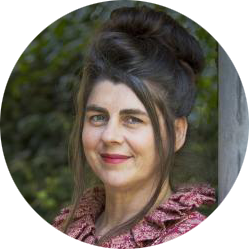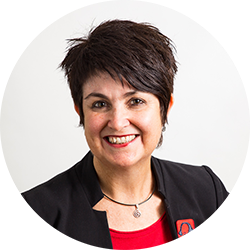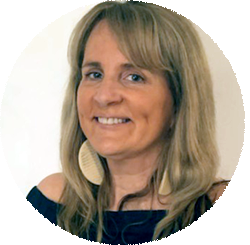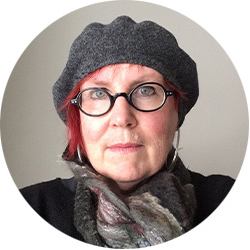REDI Event: Tales Worth Telling… 19 February, Deakin Downtown
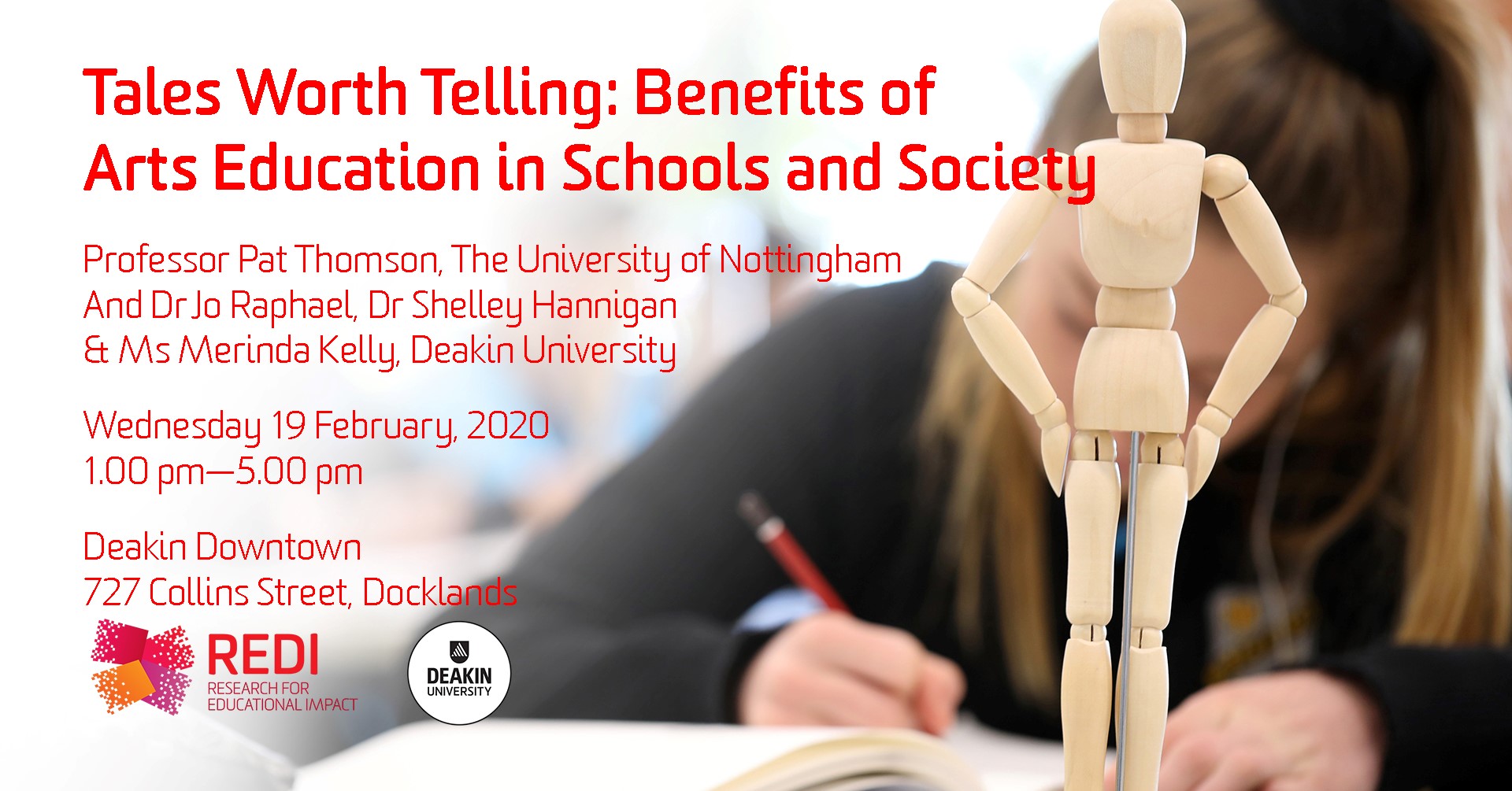 Tales Worth Telling: Benefits of Arts Education in Schools and Society
Tales Worth Telling: Benefits of Arts Education in Schools and Society
1.00pm – 5.00pm, Wednesday 19 February
Deakin Downtown, Level 12, Tower 2 Collins Square,
727 Collins Street, Docklands.
This symposia will also be live-streamed
Program:
1.00 pm
Moving from Artistic Practice to Art Education and the Interdisciplinary
Dr Shelley Hannigan (Deakin University)
In this presentation Dr Shelley Hanigan will share her research which has evolved from an arts practice into arts health and art education evolving into what she terms a ‘cA/R/Tographer’ (creative arts therapist, Artist, Researcher & Teacher). The evolution of Shelley’s practice fields has been in response to research, developing career as a creative being/artist but also in response to the needs of her students, art audiences and communities (reviews of her work, student and staff feedback and evaluations of her teaching and a collaborative self-study project). Shelley’s practice architectures have therefore been a personally gratifying but also relational process – often in response to systems, institutions, curricula and other guiding principles, policies or strategies.
Shelley’s presentation will be somewhat chronological to show how she has responded and created from her artistic practice into developing art education ideas, ways of teaching and education programs that address niche areas in the market and address student needs (Eg. Educators and Learners Unit and Creative arts therapy units).
Shelley shares this ‘survey show’ of her work because she feels people may not know what many creatives do behind the scenes and how passionate creatives are about their teaching and practices. It is important to share the big story as she proposes, as many do not understand how art can help, nurture, inspire and actually be a vocational calling for many, following their art education experiences that Pat Thompson will shed light on later in the day from her research.
1.40 pm
Seeds of Hope, Beauty and Wonder: Drama as Part of an Arts-Based Response to Natural Disasters
Dr Jo Raphael (Deakin University)
As a result of climate change, natural disasters are expected to increase over coming years impacting more communities, and more often. Given the likely effect on student learning and wellbeing, there is a need for schools and teachers to respond, but teachers often feel ill-prepared. If this is the so-called ‘new-normal’, this presentation reflects on what the new-normal might mean for reimagining teacher preparation in the arts.
The Banksia Initiative was formed in January, as a cross-disciplinary alliance of experts in arts education, general curriculum, trauma response, disaster recovery and youth and adolescent health. Within a few weeks resources were created and curated, a symposium was convened and drama workshops were presented as PD for NSW teachers preparing to return to school. As a side-shoot of Banksia, this presentation draws on research and evidence-informed practice where arts interventions are provided by teachers to assist students and school communities to process events, and in social and emotional learning and wellbeing. The focus is on examples of how drama in schools, with use of protective-distancing, metaphor, creativity and collaboration, can support processing of experiences, reimagining of futures, and enhance a sense of connectedness.
2.20 pm
Opening the Arts up to Action in Schools and Communities
Ms Merinda Kelly (Deakin University)
Merinda Kelly’s career trajectory encompasses her professional practice as an interdisciplinary artist, arts educator, cultural producer and agile arts laborer in and across a broad range of civic, cultural and educational institutions and organisations. For the purposes of this presentation Merinda will pose some questions which have re/emerged in and through her enduring work as an artist and educator in Geelong. What can the arts do in and beyond the spaces of the classroom, the studio and the white cube exhibition space? What platforms and possibilities can the arts open up for action in and beyond schools & communities? What might materialise when art opens up spaces for immanent action and potentiality?
Merinda will also share a profound and critical social turn which has unfolded in and through her creative practice over the past five years in response to iterative conditions of disruption and rapid change in the de-industrialising City of Greater Geelong. Through practice led and transdisciplinary inquiry, she will share her PhD research which examines this significant transition in the de-industrialising locale. Initially centred on objects and their relationships to personal archives and everyday life, her work shifts towards socially engaged art practice, which instead brings art and life into closer relation through collaborative and participatory public activations privileging people as medium. Enfolded in the research and the urgency of this social turn in practice are personal, lived experiences and connections to place as a life-long citizen and professional arts-based practitioner and educator in the Geelong Region. Working with these complexities and affinities of space and place, Merinda will present a brief overview of a series of Geelong-based, site-responsive and experimental interventions that she has activated individually and collectively in public and institutional spaces, including schools. As the social turn unfolds, new materialist lenses give voice to sensorial experiences, in encounter and intra/action. This research braids into Merinda’s other arts-based projects which include her work as a member of a Deakin research team currently exploring new materialist approaches to inequalities, deindustrialisation and schooling.
3.00 pm
Afternoon Tea
3.30 pm
A TALE of Arts Education
Professor Pat Thomson (University of Nottingham)
The three year study, Tracking Arts Learning and Engagement (TALE) was funded by Arts Council England, and conducted in partnership with the Royal Shakespeare Company (RSC) and Tate. It surveyed 4,500 pupils, interviewing 64 teachers and 1,600 students across 30 secondary schools, nominated because of the long-term professional involvement of either a teacher (TATE) or school (RSC) with the gallery/company. TALE is the largest study of arts education in secondary schools in the UK, that compared it’s survey results against the UK’s Taking Part national survey – a face-to-face household survey, used to analyse national cultural, digital, and sporting engagement, which has run since 2005.
The TALE study brings to light the voices and opinions of young people. The depth and breadth of the research gives significant new insights into the positive difference that sustained engagement with arts and cultural education has on the lives of young people.
IT IS TIME TO LISTEN to what young people and teachers say about the power of arts and cultural education.
IT IS TIME TO UNDERSTAND the increasing difficulties state-funded schools face in giving access and priority to arts and cultural education.
IT IS TIME TO MAKE REAL CHANGE by adopting five key recommendations to ensure every young person can learn in an arts and culture rich school.
Pat Thomson uses the detailed case studies used in their research, to explain the tale of arts education and how this flows from school to society. You can read more about the research on https://researchtale.net.
5.00 pm
Refreshments will be served at an informal networking session held immediately after the conclusion of Pat’s seminar – please join us.
Guest Speakers
Dr Shelley Hannigan has been lecturing at Deakin University in visual arts and arts education for over twelve years. As an artist her focus has been on experiential and experimental processes of creating art with a focus on identity and place issues. Bother her practice as artist and art educator over many years, led to her training as a multi-modal creative arts therapist and practicing this in hospitals. She is a qualified and registered secondary school art teacher with experience teaching across most visual art forms and media. Her research draws on her practice work from her multiple fields, with a particular interest in symbolic and metaphoric meaning that creating, making, intentions and interpretation generate. Her PhD research investigated the phenomenon of place and identity in artistic practice and thinking. Central to her practice(s) are the usefulness of art – in artistic practice, pre-service teacher education, art-education, wellbeing and STEAM. Methodologies she has used in her research include: Narrative Inquiry, phenomenology, critical autoethnography, arts practice-based research, arts-based research, A/R/Tography, narrative and visual arts-based case studies.
Dr Jo Raphael has taught arts education units at Deakin University for over 20 years. She is also artistic director of Fusion Theatre, an inclusive theatre company involving actors with and without disability. Her understanding the potential of the place of the arts in learning has strongly influenced her teaching career. She has applied drama as pedagogy within varied contexts including cultural institutions such as museums and galleries and in areas of the humanities, history, science, environmental sustainability and language learning. Jo’s PhD research was a convergence of her interests in teacher education, inclusive education and applied drama and theatre, and involved actors with disability leading pre-service teachers in drama-based workshops about teaching for diversity in regular classrooms. She works with nested methodologies: an outer and overarching layer is reflection on practice, and a second research frame is participatory action research methodology that opens a communicative space. At the heart, is arts-based research, with drama as art, pedagogy and a mode of inquiry.
Merinda Kelly is a practicing artist and lecturer in arts and education (visual arts and media) at Deakin University, Burwood. Six years ago, she returned to the University sector after working extensively as an artist and an educator in and across numerous arts-based contexts, cultural institutions and public & private organizations. Her initial arts education roles were in disadvantaged schools in the Geelong region where she activated experimental open learning programs for disengaged students, also producing school-based projects in partnership with artists and cultural institutions. This produced opportunities for travel, creative practice and employment in innovative regional projects with professional arts organizations. Whilst lecturing at Deakin and studying for a Masters Degree in Arts and Social Education, she embraced the opportunity to work in a multi-campus school managing a faculty of over 20 creative area teachers as Director of Arts, Technology & Design K-12. In this role Merinda was also responsible for developing a dedicated senior secondary art, technology & Design Campus with a strong interdisciplinary, inquiry focus. She has taught VCE Studio Arts for many years, also taking on additional roles including work as a VCE textbook, examination writer and examiner setter/vetter for the Victorian Curriculum & Assessment Authority. In this presentation, she will share her current creative arts and arts-based research interests which draw from her broad-based professional experiences as an artist and educator.
Professor Pat Thomson is Professor of Education at The University of Nottingham. She is a former school principal of disadvantaged schools in South Australia. She has been researching the arts, creativity and education in schools, communities and galleries in the UK for the last seventeen years. Together with her colleague Chris Hall she is working on the Tracking Arts Learning and Engagement research project, (see researchtale.net) in partnership with the Royal Shakespeare Company and Tate and funded by Arts Council England. She also has research partnerships and projects with the Serpentine, Nottingham Contemporary and the Freelands Foundation, an arts education charity. She has published over 200 academic books and papers and maintains a popular academic writing and research blog.

